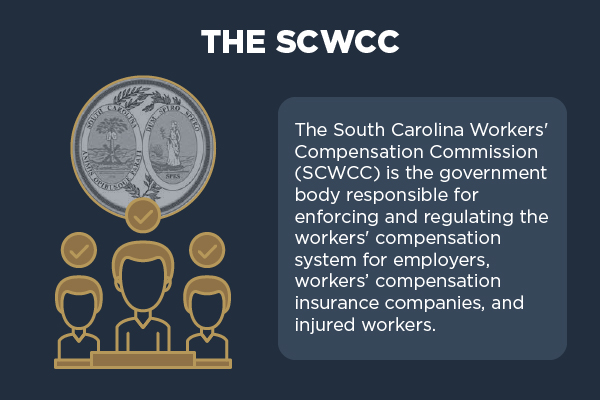
This page refers to The South Carolina Workers’ Compensation Commission and Your Case.
Since laws differ between states, if you are located in North Carolina, please click here.
The South Carolina Workers' Compensation Commission and Your Case

The SCWCC is the government body responsible for enforcing and regulating the workers’ compensation system for employers, workers’ compensation insurance companies, and injured workers.
But what is the Commission, really? What are its goals, and who serves on it? Most importantly, what impact will it have on your workers’ compensation case?
Purpose of the South Carolina Workers’ Compensation Commission
According to the South Carolina Workers’ Compensation Commission, some of the key objectives the Commission was created to accomplish include:
 |
1) Provide sure, prompt, and reasonable income and medical benefits to eligible work-related accident victims or income benefits to their dependents, regardless of fault. |
 |
2) Provide a single remedy to resolve questions and disputes, thereby reducing court delays, costs, and judicial workloads arising out of personal injury litigation. |
Learn More: How Attorneys Help Preserve the Workers’ Compensation Compromise
 |
3) Relieve public and private charities of financial demands related to uncompensated occupational accidents – that is, making sure employers and not society in general bear the cost of injured workers. |
 |
4) Promote maximum employer interest in employee safety through safety ratings. |
 |
5) Encourage employers to study the causes of accidents – rather than conceal fault – in an effort to reduce preventable accidents and human suffering. |
Who Is on the South Carolina Workers’ Compensation Commission?
There are seven commissioners that are appointed by the governor with the advice and consent of the Senate. Each commissioner serves six years but can be reappointed.
The Chairperson of the Commission is appointed by the governor and acts as a chief executive officer, serving two years in that position. The Chairperson is charged with implementing the policies the Commission establishes.
You can find an up-to-date list of current Commissioners on the SCWCC’s website.
Commissioners typically have a background in administration, government, law, business, civic organizations, public service, or a combination of some or all of those jobs.
Note: The only time you may meet all seven Commissioners is during the appeals process, if necessary.
What Does the South Carolina Workers’ Compensation Commission Do?
Apply the law to the facts of a case – The Commission is the arbiter of almost all workers’ compensation cases. If you and the workers’ compensation insurance company cannot agree on something in your claim, you can seek a hearing before one commissioner or a panel of three. Evidence of the case is examined, and a ruling is issued that solves the disagreement (unless the decision is appealed) based on workers’ compensation laws.
Apply rules equitably – The Commission is neutral and was created to ensure fairness to both employers and injured workers in workers’ compensation claims. It is worth noting that, as this is a no-fault system, injured workers’ claims should be accepted most of the time.
Try to help maintain balance – Workers’ compensation law was designed to balance the needs of workers, employers, and the judicial system. If one side is tipping the scales somehow, the Commission should operate to bring things back into balance with administrative orders, policy decisions, and so on. Making your case to the Commission with an attorney on your side can increase your chances of success.
Learn More: 7 Facts You Should Know About South Carolina Workers’ Compensation Laws
How the Commission Affects Workers’ Compensation Claims
Suppose you suffer a work-related injury. The Commission expects your employer and their workers’ compensation insurance carrier to accept responsibility for your eligible accident, cover your medical expenses and some lost wages, and get you to maximum medical improvement. That’s what South Carolina workers’ compensation laws are for, after all.
Unfortunately, it’s not always that simple. There are many different types of benefits, and most insurers have a strong financial incentive to reduce or refuse your claim. Even if you receive one type of workers’ compensation benefit, you may be entitled to others that you’re not getting.
Benefits you can seek by filing a workers’ compensation claim include:
- medical treatment and payment of approved medical bills
- wage benefits based on your average weekly wage
- permanent disability benefits if necessary
- death benefits if necessary (claimed by your family)
If any of these things are not provided by the workers’ compensation insurance company, or there is a disagreement about them, either party can ask the Commission to step in and make a ruling. If, on the other hand, there is no disagreement and benefits are timely provided to you, the Commission may never touch your workers’ compensation claim.
An Experienced Workers’ Compensation Attorney Can Help You Deal With the SCWCC

We also know how the other side works. Several of our attorneys are former defense attorneys for insurance companies. We can leverage our inside knowledge to help you.
Make sure you have a powerful firm in your corner to help you try to ensure you receive all the benefits you may be entitled to under the law.
Call us right now at 1-866-900-7078, or contact us online for a free case evaluation with no obligation.

